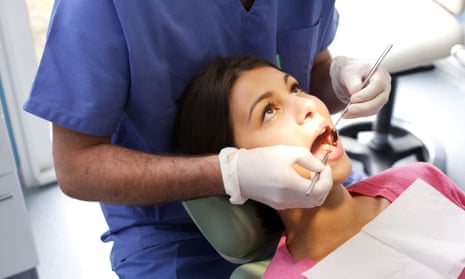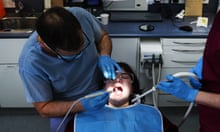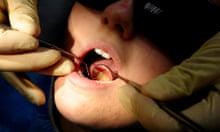Dentists in the UK should be encouraged to give antibiotics to patients at high risk of life-threatening heart infection before invasive procedures, a study has found.
Research suggests bacteria from the mouth entering the bloodstream during dental treatment could explain 30% to 40% of infective endocarditis cases. The rare but life-threatening condition occurs when the inner lining of the heart chambers and valves become infected.
Antibiotics could limit the number of cases and reduce the risk of heart failure, stroke and premature death in high-risk patients, the study says.
Current guidelines from the National Institute for Health and Care Excellence (Nice) advise against the routine use of antibiotics before invasive dental procedures for those at risk of infective endocarditis.
“Ours is the largest study to show a significant association between invasive dental procedures and infective endocarditis, particularly for extraction and surgical procedures,” said Prof Martin Thornhill from the University of Sheffield, who led the study.
Nice should review its guidelines advising against antibiotic prophylaxis, the researchers said.
Guideline committees in other countries, including the American Heart Association and the European Society of Cardiology, recommend antibiotics for high-risk patients.
“The data strongly validates the guidance of nearly all committees around the world, particularly of the American Heart Association, who recommend antibiotic prophylaxis for high-risk patients,” said Thornhill.
after newsletter promotion
The team analysed the medical, dental and prescription records of almost 8 million people in the US. Nearly 37,000 participants were at high risk of endocarditis.
The risk of infective endocarditis was 10 times smaller in high-risk patients who took antibiotics before dental extractions compared with those who did not, and 12.5 times smaller before surgical procedures.
“We were able to compare people at high risk who received antibiotic prophylaxis and those who didn’t, and clearly showed lower risk of infection after invasive procedures with antibiotics,” said Thornhill.
Nice guidance should be updated and clarified, Thornhill said: “The guidance just isn’t clear. The wording is very ambiguous and leaves open the question of whether specific patients should receive antibiotic prophylaxis.
“The current study provides the evidence needed to have discussions with patients about the risks and for dentists to recommend antibiotics when required,” Thornhill added.
A spokesperson for Nice said: “Nice takes a proactive approach to updating its guidelines, including reacting to and taking into consideration any new evidence and its potential to impact on current recommendations.”










